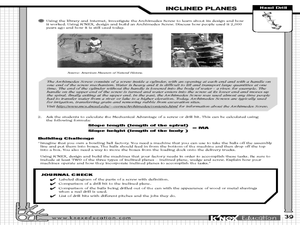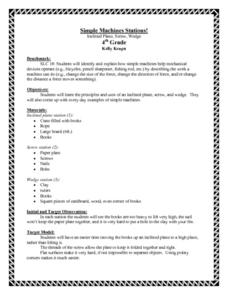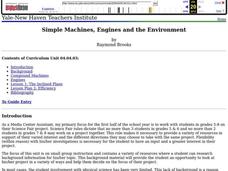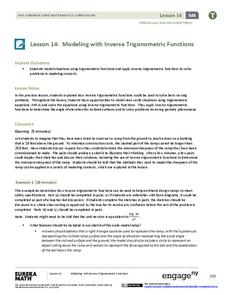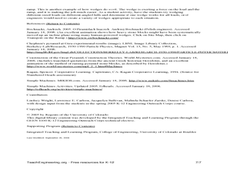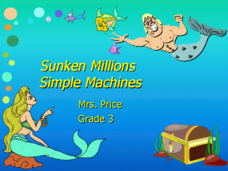Curated OER
Simple Machines I - Inclined Planes, Wedges, and Screws
The principles and uses of inclined planes, screws, and wedges are the focus of a science lesson. In it, youngsters come up with every day examples of simple machines, and build an example of one in class. That project is then used to...
Curated OER
Levers and Wedges in the Human Body
Young biologists identify parts of the body that serve as wedges (teeth and fingernails), and as levers (jaw, arms, and legs). The hands-on activities described here should be exciting for learners to perform, and should also lead to a...
Curated OER
Friction and Inclined Planes
Teaching about inclined planes may seem like an uphill battle, but there's a straightforward way to do it. An Honors Physics presentation covers static and kinetic friction, the forces of friction, and inclines. Additionally, it includes...
Curated OER
Inclined Plane and Pulley
High schoolers describe how inclined plane and pulleys make work easier. For this physics lesson, students calculate work done and mechanical advantage of both simple machines. They collect data from the experiment and construct graphs.
Curated OER
The Slant on Slides Lab
In this inclined planes worksheet, students investigate the effort force needed to move a 1 kg weight up a ramp to different distances on the ramp. Students calculate the work input and output for each trial as well as the efficiency of...
Curated OER
Ramps 1: Let It Roll!
Students explore and measure the rate of spherical objects rolling down a ramp. They discuss why different ramps work better than others, and practice procedures for testing designs and recording results.
Curated OER
Simple Machines Worksheet
Simplify students' lives with this physical science note-taking guide. From inclined planes to moveable pulleys, this resource supports young scientists with defining each type of simple machine while identifying their mechanical...
Curated OER
The Hand Drill: An Example of a Screw
Learners examine how a screw works as an inclined plane and a hand drill works as a screw. In this physics lesson, students complete two hands-on activities working with simple machines including screws and hand drills. This lesson...
Curated OER
Simple Machines I - Inclined Planes, Wedges, and Screws
Fourth graders examine the physics behind and uses for inclined planes, screws, and wedges. They determine examples of how these simple machines are used in daily life. Working in three small groups, they move from station to station...
Curated OER
Simple Machines Stations!
Fourth graders investigate the principles and uses of an inclined plane, screw, and wedge and identify examples of simple machines. They rotate through three experiment stations, complete a worksheet for each station, and read a handout...
Curated OER
Engineering - Solid Rock to Building Block
Students role-play as engineers designing wedge tools. They devise methods for shaping quarry rocks into pyramid blocks. Following a teacher demonstration, they use materials such as soap, clay, and foam for blocks and wood, plastic,...
Curated OER
Simple Machines, Engines and the Environment
Fourth graders calculate the mechanical advantage of an inclined plane. In this physics lesson, 4th graders identify the different types of simple machines and their uses. They give examples of compound machines.
Curated OER
Matching Types of Simple Machines
In this matching types of simple machines worksheet, 5th graders read the definition and examples of simple machines, then match 10 pictures of devices with 4 categories.
Agriculture in the Classroom
Six Kinds Do It All
Teach young engineers that all machines, no matter how complicated or complex, are made up of just six simple devices with this hands-on physical science lesson. Using the included templates, students first create paper models of...
EngageNY
Modeling with Inverse Trigonometric Functions 2
Use inverse trigonometric functions to work with ramps, rabbits, and Talladega. The class models real-world situations with trigonometric functions and solves them using inverses in the 15th installment of a 16-part series. Pupils solve...
Curated OER
Let it Roll!
Students explore how various ramps affect the rate of speed of a rolling object. In this physics instructional activity, students work in groups to build a ramp out of various materials. Students test and record the rate of speed of a...
Curated OER
Pyramid Building: How to Use a Wedge
Young scholars explore the simple machine of a wedge. In this wedge lesson, students test wedges on different materials including wax, soap, clay and foam. They learn how a wedge was used to build the ancient pyramid and modern day...
Curated OER
Sunken Millions Simple Machines
This PowerPoint includes a quiz show game in which two teams compete for points received by answering questions about simple machines. The content reviewed includes the types of simple machines, identifying examples of simple machines...
Curated OER
You are Uniquely You
Students compare and contrast simple machines and their functions. In this cross-curriculum science simple machines activity, students observe examples and read about simple machines, then use body movement to demonstrate how machines...
Curated OER
Simple Machines Chart
In this simple machines chart, students are given six simple machines, a description of what each is, the benefits of each type of machine and examples.
Curated OER
Slide Right On By Using an Inclined Plane
Fourth graders examine the simple machine known as a plane. They build their own pyramid and identify the role of screws. They participate in a hands-on activity in which they determine the angle in which to make it easier to pull.
Curated OER
Ramps 1: Let it Roll!
Students perform the following activity as a group so that they can gain experience with how ramps work. Students will first construct a simple ramp and then time how fast different objects roll down that ramp.
Purdue University
Simple Machines
What's the best way to use a simple machine to solve a real-world problem? Scholars construct their own simple and complex machines to explore the concepts of work and force. They discuss examples of simple machines they have found in...










